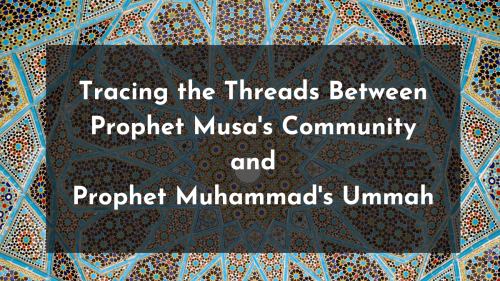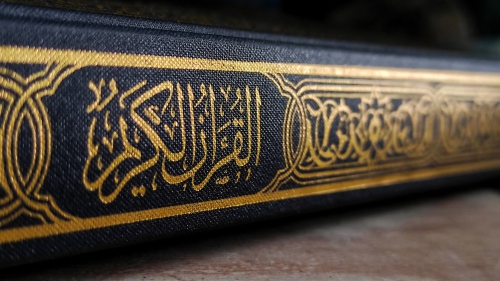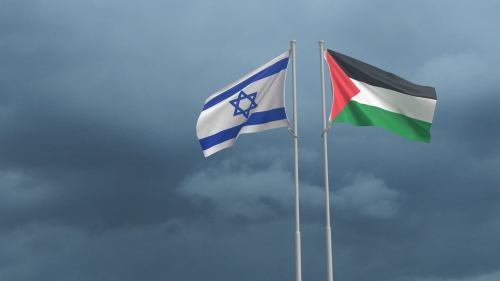Muhammad: A Prophet of War?
In this short video, Dr. Juan Cole, the Richard P. Mitchell Collegiate Professor of History at the University of Michigan, talks about what the Qur’an, the scripture revered by the world’s 1.7 billion Muslims, says about peace and why this has never been more important.
Script:
What the Qur’an, the scripture revered by the world’s 1.7 billion Muslims, says about peace has never been more important. Yet very little attention has been paid to this crucial subject. In my book, “Muhammad: Prophet of Peace amid the Clash of Empires,” I fill this gap.
Let us picture the historical Muhammad, who was born about 570 years after the death of Jesus Christ, whom he saw as his predecessor. As a merchant from the small shrine city of Mecca in western Arabia, he frequently traveled to cities like Jerusalem and Damascus in the Eastern Roman Empire. His trade would have been disrupted in the year 603, when the Iranian Sasanian Empire invaded the Roman Near East, kicking off a brutal 26-year-long war.
It was a time of both Christianity and paganism. Most people in the Roman Empire had embraced Christianity, but at the fringes of civilization, Bedouin and villagers still worshipped the old Arabian gods. Muhammad’s home town, Mecca, was the site of the Kaaba, a shrine to God. Some may have worshipped only this supreme deity, but most simply added him to a pantheon, with pagan goddesses depicted as his daughters.
Arab custom respected a major shrine to a deity—like the Kaaba—as a zone of peace. Muhammad’s clan, the Banu Hashem, were caretakers of the Kaaba and its pilgrimage and in charge of settling feuds. Peacekeeping was Muhammad’s ancestral vocation.
The Qur’an speaks, in chapter 97, of the descent on Muhammad of the holy spirit and of angels on the night of the first revelation, which occurred around the year 610, or about seven years after war between the Roman Empire and the Sassanids began. That chapter ends by saying, “and peace it is, until the breaking of the dawn.” The revelation brings with it the peace of worship and spirituality.
Muhammad began preaching a strict monotheism to Meccan pagans, who were outraged. They harassed and boycotted Muhammad’s early Believers. In the face of this persecution, the Qur’an advises Muhammad in chapter 73: “Be patient with what they say and take your leave of them graciously.” Another chapter (41) proclaims, “Good and evil are not equal. Repel the latter with the greater good, and behold, your enemy will become a devoted patron.” The chapter called “The Criterion” speaks of “the servants of the All-Merciful who walk humbly upon the earth—and when the unruly taunt them, they reply, ‘Peace.’” Some sources allege that Muhammad and the Believers supported the Roman Empire and that the pagans sided instead with the Iranian Sasanids.
The Qur’an tells Muhammad of the year 622, “Recall when the pagans were intriguing against you, to kidnap you, or murder you, or to expel you.” Under pressure, the prophet and his small community emigrated to the nearby city of Medina.
Pagan Mecca, however, launched three military campaigns in an attempt to take Medina and crush the new religion of Islam. In each case, the Believers and their allies in Medina, who included the city’s Jewish community, repelled these attacks. The Qur’an suggests that one goal of these defensive battles was to protect Roman Christian churches to the north from the pagan marauders.
The Qur’anic verses commanding self-defense have been cherry-picked by anti-Muslim writers and by small cells of extremists to depict the Prophet and the community as militant. This is far from accurate—the Qur’an says, however, “Fight in the path of God those who enter into combat against you, but do not commit aggression. God does not love aggressors.”
...
One of the last passages of the Qur’an says, “God thereby guides those who follow his good-pleasure to the ways of peace, and delivers them from the shadows into light by his leave, and conducts them to the straight path.” This passage resembles the description of John the Baptist in the Gospel of Luke. In both cases, a preacher arose in the wilderness, prophesying the advent of peace.
Topics: Conflicts And War, History, Interfaith, Prophet Muhammad (S), Quran, War Values: Peace
Views: 1429
Related Suggestions

















